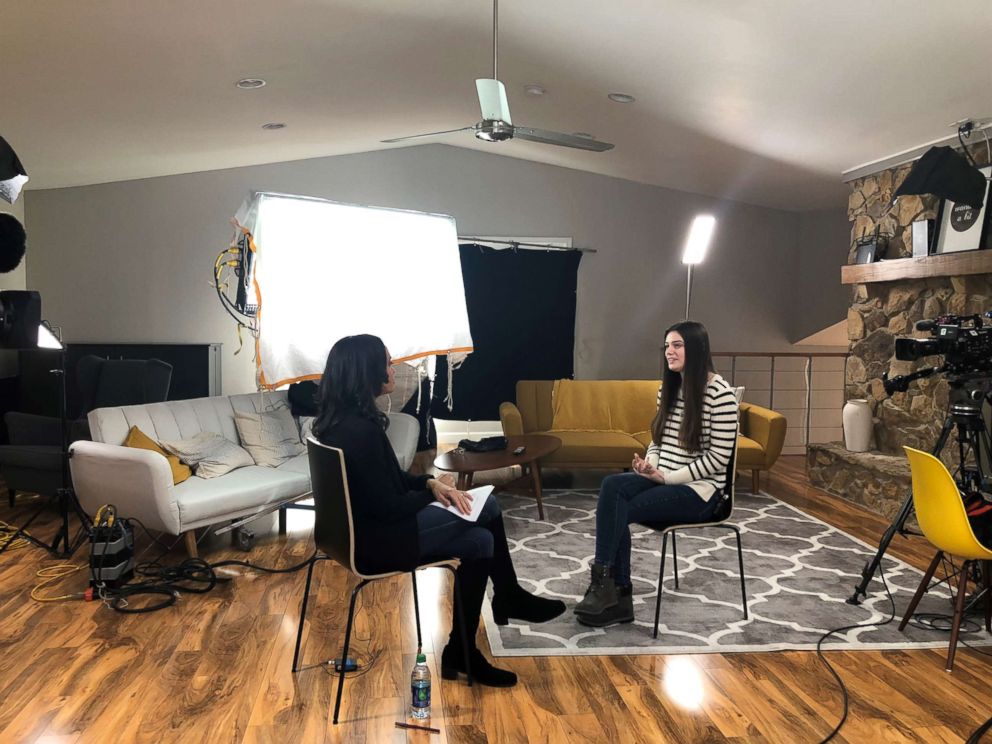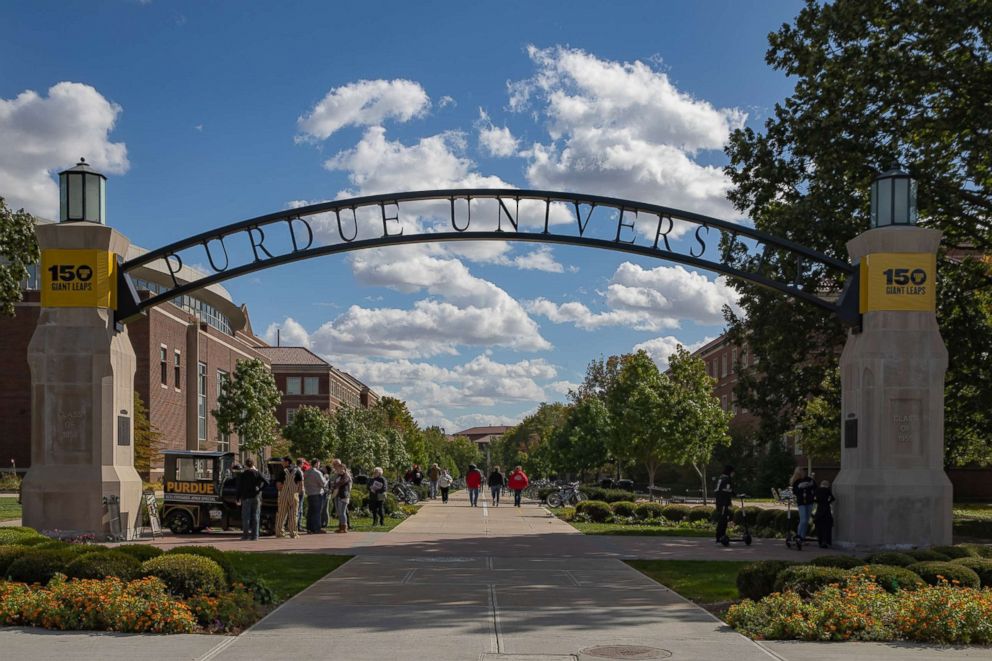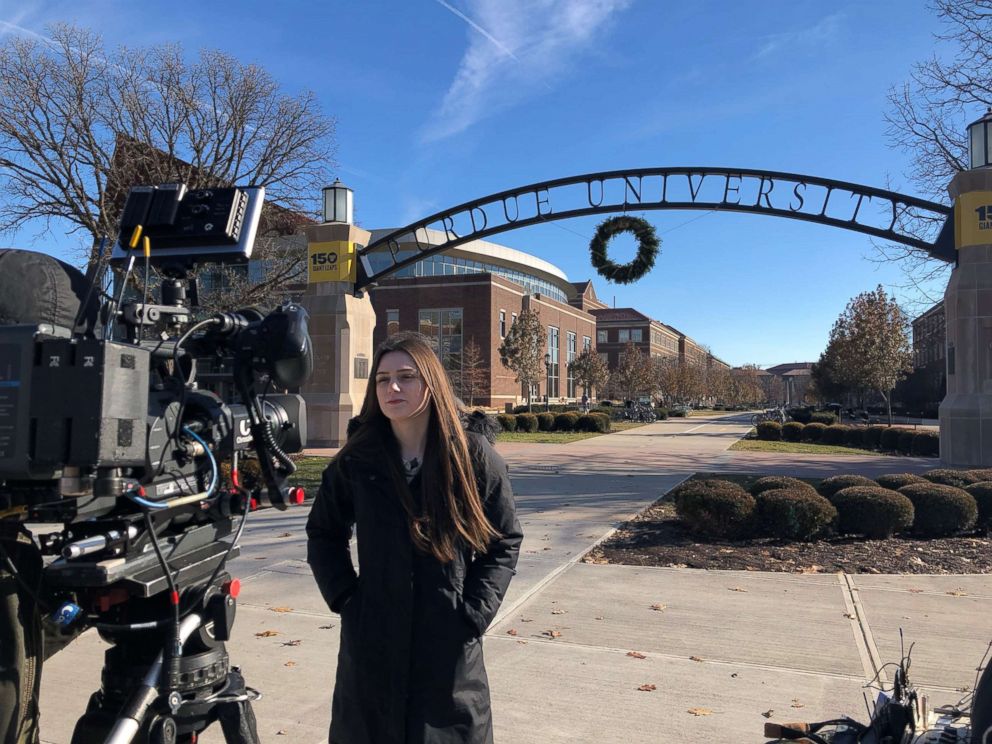College student hopes her 'rape by fraud' case will help expose a loophole in sexual assault laws
What Abi Finney considered to be rape was dismissed under Indiana law.
Abi Finney has had a difficult time "trying to act like a normal college student" after the painful memory of what she considered to be rape was dismissed under the "narrow sense" of Indiana law.
A computer science student at Purdue University, Finney opened up to "Nightline" about an incident that happened two years ago during her freshman year, that many believed to be rape by deception.
"I woke up to someone touching me. And obviously I assumed that [it] was my boyfriend, because I fell asleep with him," Finney told ABC News.

But later, she found out the man in her bed that she had sex with was not actually her boyfriend, but his friend Grant Ward.
"I was really just confused at that time. I thought maybe, like, they decided to, like, play a prank on me," she said.
But the nature of the incident exposed an unexpected loophole in sexual assault laws across the country, sparking a national conversation about what constitutes as rape.
Finney was the valedictorian of her graduating class in high school, ready to take on Purdue University as a freshman in the fall of 2016.
"I was just excited to start college," she said.

Finney moved into the first street tower dorms on campus where she met her boyfriend.
"I've always been just a very adventurous person. And-- not afraid of things," she said.
Finney didn't consider the dangers of unseen and under-reported sexual assault on college campuses across the country.
According to a sweeping survey conducted at 27 universities by The American Association of Universities, more than one in five female undergrads were victims of sexual assault or misconduct. According to the Rape, Abuse & Incest National Network RAINN, the highest risk period comes in the first few months of the first and second semesters of college.
In February 2017, Finney was at her boyfriend's dorm when she faced that risk firsthand.
"People were pretty much just hanging out-- playing video games," she recalled.
By 2 a.m. Finney, who calls herself a heavy sleeper, said she had fallen asleep in bed with her boyfriend while his friends slept on the futon below.
At some point while in his bed, Finney woke up to what she admitted was someone groping and touching her in a sexual way.
At the time, she believed the advances were from her boyfriend. A man was laying behind her and Finney said the touching turned into sex.
"I needed to go to the bathroom at some point, so I left the bed. And then -- when I went to go get back into bed, then I saw that -- Grant was in the bed instead of my boyfriend," Finney recalled.
Ward was one of the young men in the bedroom and a friend of her boyfriend.
"I just remember him smiling at me," Finney said of Ward’s reaction as she came out of the bathroom. "That’s part of why I thought it was a joke."
She continued, "I asked his friends where my boyfriend was, and they said they didn’t know."
Finney, panicked and confused, walked down the hall to her dorm room where she found her boyfriend asleep in her bed.
"I told him that I wasn't really sure what happened, but that I had sex with someone that I thought was him, and it was his friend instead," Finney recalled of the difficult conversation immediately following the incident.
At first, Finney said she thought her boyfriend was "kind of in shock because this was someone he really trusted."
But while her boyfriend went back to his room and confronted Ward, Finney waited in her room and decided to take action.
"I ended up going to the hospital to get a rape kit done," she said.

When asked the difficult question of what she would say to critics who ask why she was unable to detect that the person in question wasn't her boyfriend, even though he was behind her and in the dark, Finney said there were a couple of factors.
"Well, first of all, my boyfriend and I hadn't been together that long," she said. "But even if we had, I think people overestimate how aware they are when they're just waking up in the middle of sleeping."
Upon receiving her daughter's call, Leslie Finney said she and her family "immediately" drove to the school to be with her.
"She called me, and she said, 'Mom, I don't want you to get upset, but I was raped,'" Leslie Finney said. "And my husband and I and my younger daughter immediately got in the car and drove over to Purdue to be with her."
Within hours of the incident police picked up Donald Grant Ward. The affidavit showed that Ward told police he had waited for Finney's boyfriend to leave the bedroom and then climbed into the bunk bed with her.
"Ward indicated he had sexual intercourse with victim number one knowing she believed him to be her boyfriend," the police report stated.
With that admission, many believed this would be an open and closed case.
ABC News senior legal correspondent Sunny Hostin said when she first heard about this case it was "very clear" in her mind it was non-consensual sex –- rape.
"It was very clear to me that it was a rape case only because if you are having sex with someone and it turns out that that person is not the person you believed you were having sex with you clearly did not consent to having sex with that person," Hostin explained. "So in my mind non-consensual sex is rape."
But according to laws in Indiana, the state defines rape in only three circumstances.
The first, if the person is compelled by force, or threat of force. The second, if the person is unconscious or unaware sex is happening. And the third, if the person is so mentally disabled that they cannot consent.
Sally Siegrist, a former Indiana state representative of the district that included Purdue University, said the narrow rape laws made her sick to her stomach.
"I was so angry -- my stomach was in a knot," she said.
Siegrist added that the loophole allowed rapists to be "turned loose."
"Even amongst law enforcement and the courts and the attorneys [in] the legal profession and I think the general public had no idea that our rape laws were so narrow that there were rapists being turned loose," she added.
Siegrist found Joyce Short, a woman who has fought legal loopholes like these for years.
"I believe that by coming forward, Abby [Finney] has created a considerable amount of focus to the laws in Indiana," Short said. "And by doing so, I hope that we can spread that focus to the laws throughout the country."
Short's goal is to better define consent.
“My absolute ultimate goal is to see the world understand that non-consensual sex is a sexual assault," she explained. "And that consent is freely given, knowledgeable and informed agreement."
But even after studying consent provisions across the country, Short said that "76 percent of the states and territories in the United States have no definition of consent in their laws."
Short defines what happened in Finney's case to be considered "rape by fraud" or "rape by deception."
"She had a reasonable expectation that the man that was engaging her in sex was her boyfriend. It was her boyfriend's room. It was her boyfriend's bed," Short said.
And sadly, Short said she believes that rape by fraud "happens all the time."
Only a few states have laws covering rape by deception.
During the trial, a year after the incident took place, Finney found out that Indiana is not one of them.
"He ends up being found not guilty, because they didn't -- it didn't fit within the law, and the jury has to decide, like, based on the letter of the law," the now 21-year-old said.
Hostin said the jury didn't get it wrong, rather that "the law needs to be changed."
Ward's defense lawyer, Kirk Freeman, argued at the time that tricking someone into having sex may be immoral, but it isn't illegal in Indiana.
"She unzipped my boy's pants and knew what she was doing, she wasn't unaware of the sex," he told CBS affiliate WLFI. "Just because something is not right, doesn’t make it a crime."
Finney became emotional at the thought of the outcome in court.
"I was really disappointed. Because I felt like I gave a lot of myself for that trial," she said, holding back tears. "I feel like I gave up a lot of opportunities, and put myself back in terms of healing for that trial. And -- it just felt like a waste."
Ward was unable to be reached for comment on this story and his attorney did not respond to multiple requests for an interview with ABC News. However, his family released a statement saying, "This case should not be used as an example of impersonation to support an agenda for changing the law."
Following the trial, Ward's record was expunged and at least, from a legal perspective, now seems as if the event on Feb. 12, 2017, never happened.
Siegrist felt like having Ward's record expunged, despite his admission, added insult to injury for Finney.
"I think is just the cherry on top of the sundae of insults to Abigail," the former Indiana state representative said. "This man is walking around with no record out there of what he's done. So he's free to commit the same crime again."
Finney said she is still paying the price and that her past has made her daily life as a normal college student "really difficult."
"I suffer from PTSD and depression," she shared. "Some days it's just really difficult or impossible to even get out of bed. And so then trying to act like a normal college student with that is really difficult."
Her mother said the recovery has been "heartbreaking" to deal with as a parent.
"It has dramatically changed her life. She doesn't have as much confidence as she used to have," Leslie Finney said. "But -- I feel that she will come out of that. Cause she's a very strong person."
Finney said she had to take the spring semester off earlier this year following the reciprocal trauma of the not guilty verdict.
"Spring semester was when the trial happened and afterwards I just had a really horrible, like, depressive episode. And I was just in bed for months," she revealed.
Hostin, who has interviewed hundreds of sexual assault victims, said that healing largely begins when justice comes from the courtroom.
"I know that they feel that they can't begin to heal until they feel that they have gotten some sort of justice. And oftentimes the justice begins in the courtroom. It begins with someone believing them, believing that it happened, acknowledging that it happened," Hostin said.
Siegrist added that even though the state's laws failed Finney, it does not "negate" what happened to her.
"The fact that Indiana's law was not worded to cover Abbey's rape does not negate the fact that she was raped," she said. "There's no question in my mind that she was raped. Her body was taken and used and if that's not rape I don't know what is."
Finney’s hope is that others will be protected from future incidents of rape by fraud.
"I think he should be on the sex offender registry," she said of Ward. "Just because I want to protect future people in the future from things like this happening to them."
She added that the Indiana laws were written "in a very narrow sense of what rape is."
Siegrist is currently writing legislation to make rape by deception a crime and has continued to push it forward despite losing re-election.
"I feel that this rape not being considered a crime in Indiana is a black eye for our state. It is a black eye for victims," Siegrist said. "I absolutely think that if we don't change the law - this acquittal says we don't care if you were raped in the state of Indiana. Our laws are not going to protect you."
Critics believe that a change to the law could create a slippery slope.
One of those critics is Ward’s defense attorney.
"So, every time a guy lies and says, 'Honey, I love you.' You’re going to prosecute him for rape? Insanity," Freeman told WLFI. "Just because they are lying or being deceptive doesn't make it rape."
"He should know better," Short said. "As a lawyer he understands that the bar is very, very high for prosecuting any kind of fraud or deception."
Short continued, "Not only did they have to have a reasonable basis for believing it, but they have to also have significant proof."
Finney is back in school, still with her boyfriend and has attempted to regain control of her life.
But she said her message for any woman grappling with any similar incident, "Just know that it's not your fault."
Siegrist said Finney's persistence to move forward with this case has shed light on the issue to help protect future victims.
"I think Abby is an incredibly brave and strong young woman," she said. "Her willingness to put herself out there in public in the media social media across campus everywhere. And still go forward with this case in hope of shedding light on it and protecting future victims. She's she's a hero in my opinion."
Finney said she came forward with her story to give rape victims a human face.
"I'm sharing my story because I think people need to see rape victims as people. I think a lot of the time, victims remain anonymous, which is completely understandable. But that kind of dehumanizes us, and it's a lot easier to comment on Facebook about how horrible this girl is when she's just a nameless, faceless person, versus, like, a real-life person out there telling their story."




